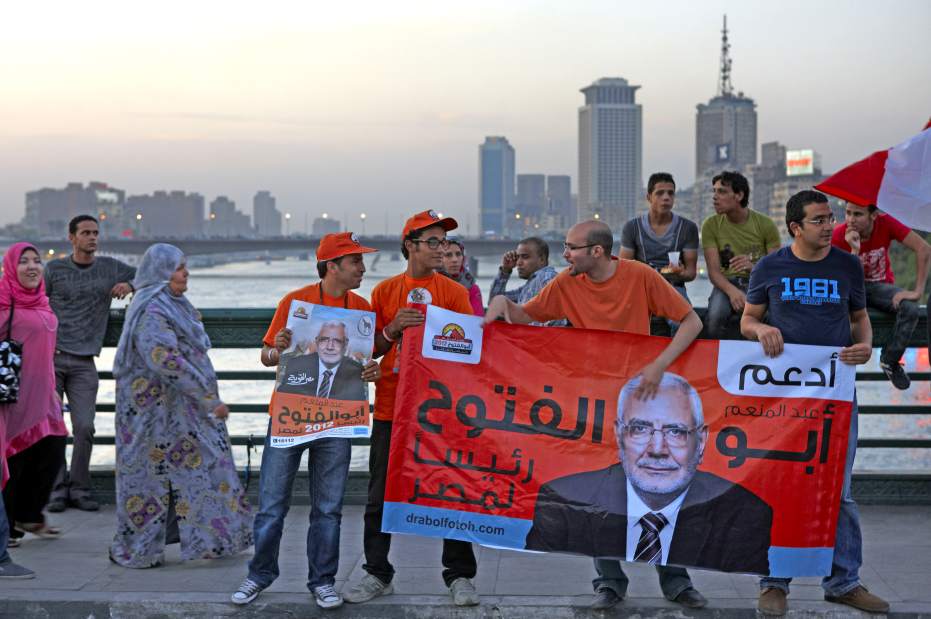https://archive.triblive.com/local/valley-news-dispatch/egypts-choice-islamist-or-liberal-will-ripple-in-u-s/
Egypt's choice -- Islamist or liberal -- will ripple in U.S.

CAIRO -- America should not turn away from Egypt as a hopelessly convoluted presidential election nears here, experts say.
No one knows what power Egypt's next president will wield, since the office remains largely undefined 15 months after the ouster of strongman Hosni Mubarak.
As Egyptians struggle to re-create their nation -- as a full-blown Islamic state, a liberal democracy, or something in between -- the ramifications are enormous for the United States and the Middle East.
"Egypt is the political and cultural center of the region, so what happens in Egypt doesn't stay in Egypt," said Khaled Elgindy, a visiting fellow of the Washington-based Brookings Institution who follows Egyptian affairs.
"The 'Arab Spring' technically started in Tunisia, but it was the Egyptian revolution that set the whole region ablaze."
With 85 million people, Egypt is the most populous Arab nation.
It also is "the pillar of everyone's policy in the region -- whether it's Israel, Europe or the United States -- because of its strategic location ... its population and its crucial role in terms of Western interest," Elgindy said.
"Whether it is oil and trade that passes through the Suez Canal, or the peace treaty with Israel, or counterterrorism, Egypt is at the nexus of all of these."
How much Islam?
Voting on a field of 13 candidates will begin on Wednesday, the first presidential race here (and one of the first among Arab nations) in which the winner is not known beforehand.
Despite pressing economic and security concerns, candidate debates and speeches largely have focused on how much Islam Egyptians want to rule their lives and how compatible an Islamic political system would be with democratic values.
That is not the result expected by liberal Egyptians (or those in the West) when protests erupted in January 2011; they hoped democracy and political liberalism would win out.
If Egyptians choose such a path, it "will have great significance for the region -- that, yes, democracy can be achieved, we can overthrow corrupt authoritarian regimes, and we can establish better political systems that give people rights and freedoms," said Samer Shehata, an associate professor of Arab politics at Washington's Georgetown University who is here to observe the election.
Military's influence
During Mubarak's 30 years in power, Egypt emerged as America's key Arab ally.
It receives $1.3 billion a year in U.S. aid, second only to Israel. Most of that goes to the military, which has ruled since Mubarak's fall and has been closely tied to America's military since the 1980s.
Joshua Stacher, a Kent State University political science professor who specializes in Egypt, said much of that aid returns to the United States.
"The close military relationship ... means that a lot of the arms we sell, we sell to Egypt," he explained.
Initially, most Egyptians praised the military for forcing Mubarak aside. Even the Muslim Brotherhood, which has pressed for Islamic rule since the 1920s, did not challenge the generals, fearing a repeat of Nasser-era crackdowns of the 1950s and '60s.
As post-Mubarak unrest grew, however, the army reacted harshly and its popularity plummeted.
Now many Egyptians accuse the military of clinging to power, which the junta denies.
Who shares U.S. ideals?
As the Brotherhood and its Islamist allies have consolidated power in the past year and won control of parliament in January, liberal Egyptians and minority Christians have grown alarmed.
They fear that if one of two Islamic front-runners becomes president, Islamic law and values will be imposed on everyone and Western-style freedom will disappear.
Yet more and more men here wear the long beards of ultra-Islamist Salafis.
Businessman and political analyst Hany Ghoraba describes himself as the "Jack Bauer of Egyptian liberals," referring to the tough U.S. anti-terrorism agent on the Fox TV series "24."
Ghoraba said he is "confounded ... seeing U.S. congressmen just going to meet the Muslim Brotherhood and the Salafis, as if they are all of Egypt -- and that is not the case."
Only Egyptian liberals and socialists, he said, "share the same ideals of freedom that Americans believe."
"I hope the American administration and the entire Western world won't let go of the Egyptian case," Ghoraba said. "... If the situation in Egypt works, it will work for the rest of the region. If it doesn't work, it will certainly have a very bad rippling effect."
Kent State's Stacher agrees.
If democracy doesn't take hold here, he warns, "then we can anticipate more seething frustration ... building under the surface until the next explosion."
Copyright ©2025— Trib Total Media, LLC (TribLIVE.com)
